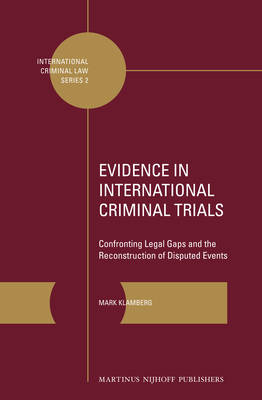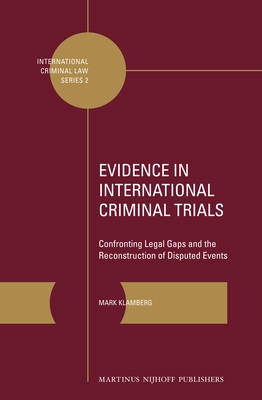
- Afhalen na 1 uur in een winkel met voorraad
- Gratis thuislevering in België vanaf € 30
- Ruim aanbod met 7 miljoen producten
- Afhalen na 1 uur in een winkel met voorraad
- Gratis thuislevering in België vanaf € 30
- Ruim aanbod met 7 miljoen producten
Zoeken
Evidence in International Criminal Trials
Confronting Legal Gaps and the Reconstruction of Disputed Events
Mark Klamberg
€ 375,45
+ 750 punten
Omschrijving
In Evidence in International Criminal Trials Mark Klamberg compares procedural activities relevant for international criminal tribunals and the International Criminal Court, including evaluation, collection, disclosure, admissibility and presentation of evidence. The author analyses what objectives are recognized in relation to the aforementioned procedural activities and whether it is possible to establish a priority between them. The concept of "robustness" is introduced to discuss the quantity of evidence in addition to concepts that deal with quality. Finally, the exclusion of every reasonable hypothesis of innocence method is examined as one of several analytical steps that may contribute to the systematic evaluation of evidence. The book seeks to provide guidance on how to confront legal as well as factual issues.
Specificaties
Betrokkenen
- Auteur(s):
- Uitgeverij:
Inhoud
- Aantal bladzijden:
- 600
- Taal:
- Engels
- Reeks:
- Reeksnummer:
- nr. 2
Eigenschappen
- Productcode (EAN):
- 9789004236516
- Verschijningsdatum:
- 21/02/2013
- Uitvoering:
- Hardcover
- Formaat:
- Genaaid
- Afmetingen:
- 155 mm x 235 mm
- Gewicht:
- 1010 g

Alleen bij Standaard Boekhandel
+ 750 punten op je klantenkaart van Standaard Boekhandel
Beoordelingen
We publiceren alleen reviews die voldoen aan de voorwaarden voor reviews. Bekijk onze voorwaarden voor reviews.








